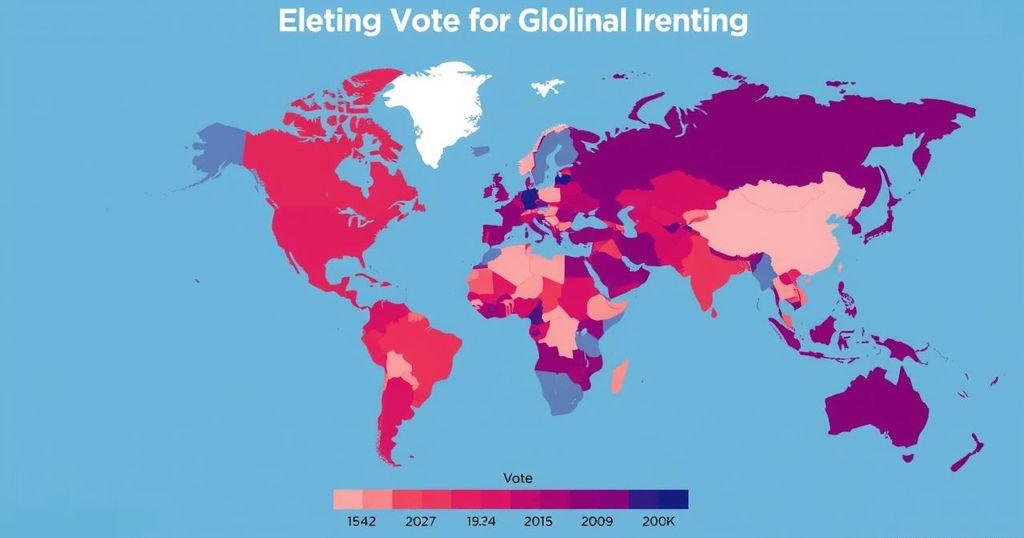A Comprehensive Review of the Global Elections of 2024
In 2024, elections took place in over 70 countries, engaging nearly half of the world’s population. India led with the largest democratic exercise, while key results included a coalition victory for Modi in India and Donald Trump’s presidency in the United States. Voter turnout varied significantly, with Rwanda at 98.2% and Tunisia at 28.8%. Significant political shifts were observed, including the end of Assad’s rule in Syria, reflecting the complexity of contemporary governance.
In 2024, over 70 countries conducted elections, including the 27 European Union member states that participated in the EU parliamentary elections. Collectively, these elections engaged approximately four billion citizens, highlighting India’s democratic exercise, where 637.4 million people voted in a multi-phase process. Voter turnout averaged 61% globally, with notable extremes such as Rwanda’s 98.2% and Tunisia’s stark low of 28.8%. Key electoral outcomes included Narendra Modi’s Bharatiya Janata Party in India losing its parliamentary majority but forming a coalition, and Donald Trump winning the U.S. presidency against Kamala Harris, who succeeded Joe Biden in the Democratic race. Additionally, incumbent leaders such as Cyril Ramaphosa in South Africa and Nicolas Maduro in Venezuela faced challenges to their popularity and governance. Significant shifts occurred as new leaders emerged in countries like Austria and Botswana, while some leaders, such as Bangladesh’s Sheikh Hasina, faced removal amid civil unrest. Elections in Syria concluded with the removal of Bashar al-Assad due to a surprise offensive, marking the end of a prolonged civil conflict. Such global electoral dynamics underscore diverse political landscapes and varying degrees of voter engagement, characterized by both triumphs and setbacks in democratic governance.
The elections of 2024 exemplified the global exercise of democracy, with diverse outcomes reflecting the political climate across various nations. Over 70 countries engaged in the electoral process, indicating widespread participation in shaping governance amid differing sociopolitical contexts. Voter turnout metrics served as an essential indicator of civic engagement, revealing stark contrasts between nations, while the results provided insight into incumbent leaders’ stability and the emergence of new political figures, highlighting the fluidity of global leadership.
The 2024 global elections revealed a complex landscape of political engagement, characterized by fluctuating voter turnout, the retention of some incumbents, and the emergence of new leaders. The contrasting electoral results across regions—from the high engagement in Rwanda to the political turmoil in Tunisia—underscore the unique challenges each nation faces in their democratic journey. This cycle also highlighted the impact of public discontent with established leaders, demonstrated by the forced resignations and electoral defeats in several countries. It is clear that while democracy remains a robust framework for governance, its execution varies significantly across the globe, influenced by local contexts and societal demands.
Original Source: www.aljazeera.com




Post Comment